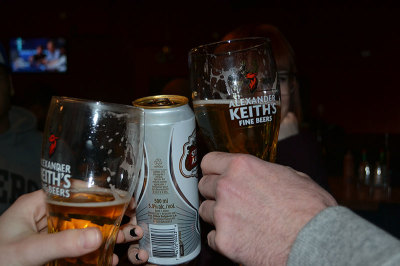
STORY BY ADAM JOHNSTON
One and done, or 25 to life. It is entirely your choice.
These are your options when you get behind the wheel after drinking this holiday season. One drink per night and done, or risk the possibility of prison, or worse death, if you choose to rely on an over-the-counter gadget to measure your Blood Alcohol Content (BAC) level.
“The safest thing to do if you’re going to drive is, preferably no drinks at all, but maybe one and done,” said Halton Regional Police Service Constable Al Williamson. “Just have one and nurse it all night. There’s too much at stake here. If you’re going to drink, you have to make alternate arrangements.”
In fact, if you have been in a motor vehicle accident, even registering a .05 BAC reading can have you charged with impaired driving. The police often call on expert witnesses to testify to the fact that any alcohol in the blood stream may render a driver impaired.
The Sheridan Sun conducted it’s own research recently comparing personal breathalyzers to the professional-grade, police-issued tests.
The consumer-version breathalyzer gave conflicting readings on a regular basis, several times doubling the previous reading in the same five-minute span. On numerous occasions, the over-the-counter device failed to register any alcohol at all.
MORE RELATED TO THIS STORY:
Three journalists – one female and two males, of varying heights and weights – submitted to a police-issued test as well. The female participant failed the test after consuming two and a half draught beers in the span of two hours. Both males produced a “caution” reading after downing two beers in an hour and a half, and four beers over the course of three hours, respectively.

“Quite frankly, I wouldn’t rely on any of the over-the-counter ones,” said Constable Williamson. “I know that in Britain, you can buy breathalyzers for civilian use. I think they’re a lot more reliable than the one-use ones they have here. But, I wouldn’t rely on that without some cold, hard scientific evidence.”
“[The results of drinking and driving are] like a reverse lottery. The thing is, the odds of losing are much, much higher than the odds of a winning lottery ticket” – Constable Al Williamson, Halton Regional Police Service
Carolyn Swinson, a representative from the southern-Ontario chapter of Mothers Against Drunk Driving, echoes the sentiments of the Halton police, adding that personal breathalyzer devices encourage people to drink to the legal limit of BAC, when in actuality they shouldn’t be drinking and driving at all.
“We have had major concerns about the handheld ones because of the reliability of them. So, we certainly don’t endorse them,” she said.
Constable Williamson believes that results of drinking and driving simply don’t justify the reward of saving money on a cab, or having your vehicle in the morning.
“It’s like a reverse lottery. The thing is, the odds of losing are much, much higher than the odds of a winning lottery ticket.”
